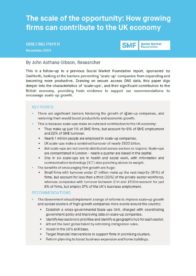Building on the findings of a previous report investigating the barriers to the expansion of ‘scale-ups’, this briefing digs deeper into the characteristics of ‘scale-ups’ and their significant contribution to the British economy, providing fresh evidence to support our recommendations to encourage scale-up growth.
KEY POINTS
- There are significant barriers hindering the growth of scale-up companies, and removing them would boost productivity and economic growth.
- This is because scale-ups make an outsized contribution to the UK economy:
- They make up just 1% of SME firms, but account for 8% of SME employment and 22% of SME turnover.
- Nearly 1 million people are employed in scale-up companies.
- UK scale-ups make a combined turnover of nearly £500 billion.
- But scale-ups are not evenly distributed across sectors or regions:
- Scale-ups are concentrated in London, with nearly a quarter based in the capital.
- One in six scale-ups are in health and social work, with information and communication technology (ICT) also punching above its weight.
- The benefits of encouraging firm growth are huge:
- Small firms with turnover under £1 million make up the vast majority (91%) of firms, but account for less than a third (30%) of the private sector workforce, whereas companies with turnover between £1m and £100m account for just 8% of firms, but employ 37% of the UK’s business employment.
RECOMMENDATIONS
- This briefing builds on the findings and recommendations of Full scale, an SMF report on the barriers to scaling up SMEs published in September 2023 and kindly sponsored by OakNorth Bank.
- The Government should implement a range of reforms to improve scale-up growth and spread clusters of high-growth companies more evenly around the country:
- Establish a cross-governmental Scale-ups Unit, charged with coordinating government policy and improving data on scale-up companies.
- Identify key sectors to prioritise and identify a geographic hub for each sector.
- Attract the best global talent by reforming immigration rules.
- Invest in the UK’s skill base.
- Target financial interventions to support firms in promising clusters.
- Reform planning to boost business expansion and home buildings.

DOWNLOAD THE BRIEFING: PDF
Kindly sponsored by

